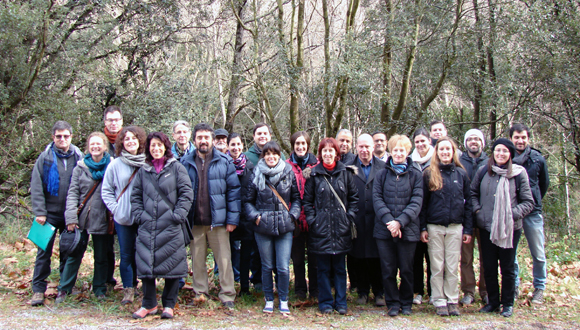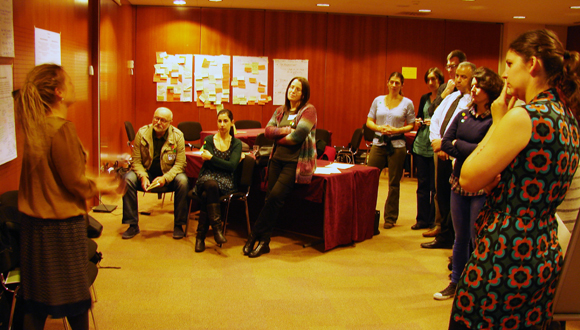BeWater Kick-Off Meeting: Productive Participation & Partnership
More than 30 participants from around Europe gathered in Barcelona, Spain, for the first meeting of a new European project which will involve the active participation of society in water adaptation to global change.

The stage for collaboration over the coming three and a half years was set at the BeWater project’s Kick-off Meeting, held on 13 – 15 January 2014. In line with the approach of the project, participatory techniques were used in the meeting in order to define working methods, agree a common language and identify the challenges involved in implementing this complex project effectively.
A field trip to the Case Study River Basin in La Tordera, which has its headwaters within the Montseny Natural Park, allowed partners to see and to hear firsthand from local stakeholders the challenges involved in water management practices in the area.
The project consortium includes partners from research centres, businesses, NGOs and European institutions. Involving platforms and organisations with a strong track record in stakeholder engagement processes is a clear signal that one of BeWater’s principal aims is applied: that this project will be truly participatory in nature and that knowledge generated in the local context will be transferred to national and international audiences. “We are now about to start the first stage of the participatory processes in each one of the Case Study River Basins, where we aim at engaging society in the discussion on current water uses and their related problems, specially focusing on the expected climate change impacts at River Basin scale,” says Anabel Sanchez (CREAF), who coordinates the consortium of 12 partners from around the Mediterranean basin.

Over the next 3.5 years, the BeWater project will be active in 4 Case Study River Basins in Catalonia, Cyprus, Slovenia and Tunisia. It will engage a wide group of stakeholders in an iterative process of mutual learning between society and science, with the aim of building societal resilience to the impacts of global change in the Mediterranean. Projections for the Euro-Mediterranean region estimate an increase in water scarcity and droughts in the region, causing substantial socioeconomic losses and environmental impacts.
The combination of improved awareness, mutual learning processes and shared responsibility of the civil society and stakeholders are essential to ensure successful adaptation strategies and their implementation.
Using a bottom-up approach, BeWater will identify sustainable and adaptive management options at river basin scale, to be developed into adaptation plans which, it is hoped, will ultimately lead to effective adaptation policies, whilst raising awareness about the challenges of water management and water use among local populations. This approach is supported by newly developed methodologies integrating physical, ecological, social and management processes at river basin scale, allowing for an out-scaling of results of national and international relevance.
EFI's Mediterranean Regional Office- EFIMED is Work Package leader for Communications and Dissemination and will participate in the technical work packages which will work closely with stakeholders in four Mediterranean river basins to develop water management options, adaptation plans and policy recommendations for sustainable water management and climate change adaptation.
BeWater is financed through the 7th Framework Programme of the European Commission under the Science in Society initiative.
Anabel Sanchez: a.sanchez ( at) creaf.uab.cat
Photos: Sarah Adams & Elsa Varela







